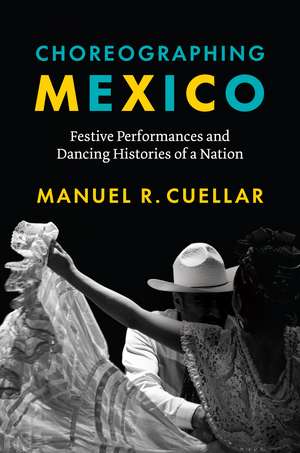Choreographing Mexico: Festive Performances and Dancing Histories of a Nation
Autor Manuel R. Cuellaren Limba Engleză Paperback – 15 feb 2025
The impact of folkloric dance and performance on Mexican cultural politics and national identity.
The years between 1910 and 1940 were formative for Mexico, with the ouster of Porfirio Díaz, the subsequent revolution, and the creation of the new state. Amid the upheaval, Mexican dance emerged as a key arena of contestation regarding what it meant to be Mexican. Through an analysis of written, photographic, choreographic, and cinematographic renderings of a festive Mexico, Choreographing Mexico examines how bodies in motion both performed and critiqued the nation.
Manuel Cuellar details the integration of Indigenous and regional dance styles into centennial celebrations, civic festivals, and popular films. Much of the time, this was a top-down affair, with cultural elites seeking to legitimate a hegemonic national character by incorporating traces of indigeneity. Yet dancers also used their moving bodies to challenge the official image of a Mexico full of manly vigor and free from racial and ethnic divisions. At home and abroad, dancers made nuanced articulations of female, Indigenous, Black, and even queer renditions of the nation. Cuellar reminds us of the ongoing political significance of movement and embodied experience, as folklórico maintains an important and still-contested place in Mexican and Mexican American identity today.
Preț: 217.01 lei
Nou
Puncte Express: 326
Preț estimativ în valută:
41.53€ • 43.44$ • 34.49£
41.53€ • 43.44$ • 34.49£
Carte disponibilă
Livrare economică 13-27 martie
Livrare express 26 februarie-04 martie pentru 32.09 lei
Preluare comenzi: 021 569.72.76
Specificații
ISBN-13: 9781477330807
ISBN-10: 1477330801
Pagini: 344
Ilustrații: 32 b&w photos
Dimensiuni: 152 x 229 x 33 mm
Greutate: 0.5 kg
Editura: University of Texas Press
Colecția University of Texas Press
ISBN-10: 1477330801
Pagini: 344
Ilustrații: 32 b&w photos
Dimensiuni: 152 x 229 x 33 mm
Greutate: 0.5 kg
Editura: University of Texas Press
Colecția University of Texas Press
Notă biografică
Manuel R. Cuellar is an associate professor of Spanish and Latin American literatures and cultures at George Washington University.
Cuprins
- Preface
- Acknowledgments
- Introduction. Choreographing a Festive Nation: Performance, Dance, and Embodied Histories in Mexico
- Chapter 1. Rehearsals of a Cosmopolitan Modernity: The Porfirian Centennial Celebrations of Mexican Independence in 1910
- Chapter 2. La Noche Mexicana and the Staging of a Festive Mexico
- Chapter 3. Nellie Campobello: The Choreographer of Dancing Histories in Mexico
- Chapter 4. Cinematic Renditions of a Dancing Mexico: Folklórico Dance in Mexican Film
- Epilogue. Queering Mexico’s Archive: Ephemerality, Movement, and Kinesthetic Imaginings
- Notes
- Bibliography
- Index
Recenzii
Choreographing Mexico is a long-overdue critical study of Mexican traditional and regional dance known today as folklórico…[a] fascinating and well-researched volume...Cuellar proves that Mexican regional dance is a social embodiment that at times reproduces nationalistic tropes and at others critiques them. Choreographing Mexico is a rich exploration of how bodies in motion create and recreate the idea of a nation...Choreographing Mexico offers a welcome and new interdisciplinary look at folklórico dance as essential to Mexican cultural formations. The volume will be important for Mexicanists and scholars of dance and performance. Accessible to multiple audiences, Choreographing Mexico is for anyone interested in Mexican culture and anything Mexican.
Cuellar’s project advocates for an attention to dance and embodiment as a meaning-making practice and informs our understanding of how Mexican nationalism was choreographed onto the body. A wealth of archival images interspersed throughout the book compliments Cuellar’s analysis. Heavy on theory, Choreographing Mexico would appeal to dance graduate students and scholars of Mexican history, nationalism . . . Cuellar’s incorporation of his own experience as a teacher and dancer grounds the work’s significance in the present and adds important and overarching insight to the ways dance forms community and contributes to individual and collective identity formation.
Ultimately, the book offers a rich cultural analysis of dance in connection with the national construction of Mexico, which also makes it possible to apply its ideas to other periods and cultural realities.
En definitiva, el libro ofrece un análisis cultural de la danza de gran riqueza en conexión con la construcción nacional de México, posibilitando también aplicar sus ideas a otras épocas y realidades culturales.
En definitiva, el libro ofrece un análisis cultural de la danza de gran riqueza en conexión con la construcción nacional de México, posibilitando también aplicar sus ideas a otras épocas y realidades culturales.
Choreographing Mexico is a vital resource for scholars researching Mexican performance forms and cultural history . . . Queering dominant narratives and reading representations of the popular against the grain, he disrupts conventional approaches to understanding a national past. Cuellar demonstrates how embodied expression can be a site of knowledge, a resource for historical research, and a practice of world-making.
Choreographing Mexico: Festive Performances and Dancing Histories of a Nation leaves the reader well-positioned to raise further questions about the implications of contemporary, embodied folklórico dance through the gendered/gender queer spectrum. Scholars as well as general audiences with an interest in Mexican diasporic identities as expressed through folklórico’s embodied knowledges, and set in its evolving, contested histories, will find this volume a welcome addition.
Descriere
The impact of folkloric dance and performance on Mexican cultural politics and national identity.
